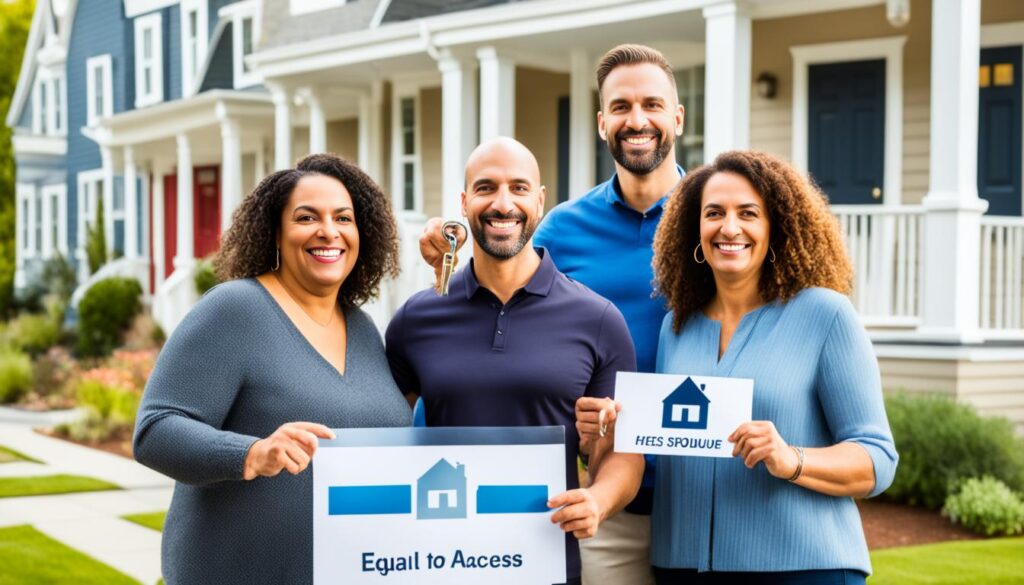Buying a home is a big step that many dream of. It’s not easy but can be straightforward with the right info. This guide will help you make your dream house a reality. It will show you how to understand your budget, find a good mortgage, and pick the perfect home.
Key Takeaways:
- Buying a house is a significant milestone and requires careful consideration.
- Understanding your budget and exploring financing options is crucial.
- Knowing your rights and responsibilities as a homebuyer is important.
- Comparing different mortgage options can save you money in the long run.
- Exploring homebuying programs can provide additional resources and options.
Determine Your Budget
Before starting to look for a home, figure out your budget. This includes adding up how much you can spend on a house. It looks at your income, credit score, what you spend every month, a down payment, and the interest rate. Knowing your financial situation well will help you set a budget realistically. This way, you don’t find yourself overspending.
First, think about how much you make. Count your earnings from your job, any bonuses, and extra income. Remember, it’s what you have left after taxes and necessary expenses. This gives you a starting point for how much you can spend on a home.
Let’s talk about your credit score now. A strong credit score means you’re good at paying back loans. This affects the interest rate you get on a mortgage. Get a credit report to see where you stand. A better credit score means you might get a better deal.
Next, look at what you spend each month. List your bills and other regular expenses, as well as the things you buy more randomly like food or going out. This helps you see what’s left for your home’s monthly payment.
Now, about the down payment. This is a key part of buying a home. It shows you’re serious and can lower your monthly payments. Decide how much you can put down. Make sure it fits your future plans.
Don’t forget the interest rate on your loan. This rate influences how much you’ll pay every month. Stay updated on rates. You can use tools online or talk to a financial expert to understand the costs clearly.
Consider these steps to nail down your budget. Talking to a pro can be smart to double-check your numbers. Making a solid budget is the first step to finding your dream home.

Example Budget Calculation
Let’s show how to calculate your budget with an example:
| Income | Amount |
|---|---|
| Monthly Salary | $5,000 |
| Additional Earnings (Bonuses, etc.) | $1,000 |
| Total Income | $6,000 |
| Monthly Expenses | Amount |
|---|---|
| Utility Bills | $500 |
| Groceries | $400 |
| Entertainment | $300 |
| Total Expenses | $1,200 |
| Credit Rating | Interest Rate |
|---|---|
| Excellent (750+) | 3.5% |
| Down Payment | Percentage |
|---|---|
| Total Home Price | $300,000 |
| Down Payment (20%) | $60,000 |
Here’s how your budget might look using these figures:
Monthly Affordability:
[(Total Income * 0.36) – (Total Expenses)] = [($6,000 * 0.36) – ($1,200)] = $1,560
Now, factoring in the interest rate and down payment, let’s see the max house price:
[(Monthly Affordability * 100) / (0.28 * Interest Rate)] + Down Payment = [($1,560 * 100) / (0.28 * 3.5)] + $60,000 = $541,714
This person, based on our example, could afford a home up to about $541,714.
Understand Your Rights and Responsibilities
Being a homebuyer means knowing what you can and should do. Understanding your rights is part of this. Knowing the laws and rules helps keep you safe and makes choices clear. Here are some key points to consider:
Fair Housing
The Fair Housing Act is crucial to know about. It makes sure everyone has a chance at a home, no matter their background. Learn about this act to make sure your homebuying experience is fair and open to all.
Real Estate Settlement Procedures Act (RESPA)
RESPA is a big help for buyers. It makes lenders share key info on loans and stop unfair practices. By understanding RESPA, you’ll find dealing with mortgages easier and stay safe from harmful deals.
Borrower’s Rights
When borrowing, you have important rights to safeguard you. These rights cover clear loan terms, fair loan management, and protection from bad lending practices. Knowing these helps ensure you’re treated fairly and confidently become a homeowner.
Predatory Lending
Watch out for shady lending tricks. Being able to spot high rates, extra fees, and shady loan terms is vital. Avoiding unfair lenders protects you and your money.
Knowing about fair housing, RESPA, your rights as a borrower, and how to avoid predatory lending is crucial. It leads to a better and more just way to buy a home. This knowledge is power on your way to owning a home.

Shop for a Mortgage
Shopping for a mortgage is crucial when buying a home. It lets you look at different lenders and loans to find the best match for you. It’s about meeting your needs and financial goals.
Here are important factors to think about:
- Interest Rates: Looking at rates from various lenders is key. A small rate difference can save you a lot over several years.
- Loan Terms: Think about how long you want your loan to last. Sometimes, a longer loan means lower monthly payments, but it may cost you more in the end.
- Fees: You should also consider the fees like closing costs. These can change your mortgage’s final cost, making it higher or lower.
- FHA Loan Programs: If you’re buying a home for the first time or have limited funds, look into FHA loans. They feature easier credit requirements and lower down payments.
Comparing Loans
Compare loan quotes from several lenders. This can help you find the best terms. It may also give you a chance to get better rates or terms through negotiations.
Choosing the right mortgage is a big financial move. Take your time to compare and ask questions. This helps ensure your choice fits with your financial plans.
Using online mortgage comparison tools can make the process easier. These tools let you see and compare various loan options using your own details.
Keep in mind, lenders have their own rules and criteria. So, read the details of each offer carefully.
Negotiating Interest Rates
After choosing your top loan options, you can try to get better terms. Use offers from one lender to talk to another. You might get a better deal, especially if you have a good credit score.
Mortgage Shopping Tips:
- Start by comparing rates, terms, and fees from different lenders.
- If you can, look into FHA loans.
- Use online tools to see different offers.
- Don’t be afraid to negotiate for better rates or terms.

Shopping for a mortgage takes work but it’s worth it. By comparing options, negotiating rates, and considering FHA loans, you can make a smart choice. This choice will save you money and help you become a successful homeowner.
Explore Homebuying Programs
Buying a home can be made easier through various programs. They help with affordability and access. Programs cater to different needs, offering assistance to many.
Many homebuyers look into state-specific options. These programs meet the unique needs of the state. You might find help with a down payment or special deals for professionals like teachers.
The Housing and Urban Development (HUD) has a few programs as well. These are for low-income individuals and families. For instance, the Good Neighbor Next Door program offers big home discounts in certain areas.
The Indian Home Loan Guarantee Program helps Native Americans buy homes. It offers mortgage guarantees, making it easier to own a home.
Looking into various programs reveals more options. You might find help with your down payment, state programs, or special HUD initiatives. These can help you on your homebuying journey.

State-Specific Homebuying Programs
Every state offers unique programs to assist its citizens. These could include help with down payments, education, and good loan terms. Here’s a sample of what’s available:
| State | Program Name | Key Benefits |
|---|---|---|
| California | California Housing Finance Agency (CalHFA) | Down payment help, good interest rates |
| Texas | Texas Department of Housing and Community Affairs (TDHCA) | Grants for first-time buyers, mortgage certificates |
| Florida | Florida Housing Finance Corporation | Options for low down payments, mortgage certificates |
Note: The table shows just a few examples. Your state likely has more. It’s important to look into what’s available where you live.
HUD’s Special Homebuying Programs
HUD runs programs to help more people own homes. Some benefits include down payment help and good loan terms. Specific groups, like teachers, can also find extra support. Here are some key HUD programs:
- Good Neighbor Next Door Program: Offers HUD home discounts for certain professionals.
- Homeownership Voucher Program: Aids in transitioning renters to homeowners.
- Section 184 Indian Home Loan Guarantee Program: Helps Native Americans get mortgages.
Indian Home Loan Guarantee Program
This federal program helps Native Americans with home financing. It’s managed by the Office of Native American Programs at HUD. The goal is to boost homeownership and improve access to financing on tribal lands.
Here are some highlights of the Indian Home Loan Guarantee Program:
- Low down payment requirements
- Flexible credit criteria
- Longer loan terms
- Interest rate options
For Native Americans, this program can remove the hurdles to owning a home.
Overall, learning about these programs can lead to more options. With state, HUD, or Indian Home Loan programs, buying a home can be both affordable and within reach. These programs can be a game-changer on your path to owning a home.
Find Your Dream Home
After you’ve set your budget and know your financing options, it’s time to search for your dream home. It’s an exciting part of the homebuying process. You start imagining yourself in a place you can truly call your home.
Make a wish list to help find the right home. Include what’s important to you, like a big backyard, a new kitchen, or a warm fireplace. This way, you can figure out what matters most as you look at homes.
This list helps when using a checklist to compare homes. You can note down what you like and don’t like about each home. It makes it easier to see which one best matches what you’re looking for.
There are many ways to find homes for sale. Searching online lets you look from home. Real estate agents are also great as they know about many houses and can find what suits you.
Be open to different kinds of homes, like ones that need work or those that are already made. Fixer-uppers are budget-friendly and let you make it truly your own. Manufactured homes are another affordable choice that you can make uniquely yours.
By searching carefully and using your wish list and checklist, you can find the perfect home. This home will not only match your needs but also make you feel happy and excited. Enjoy the hunt for your new home!
Make an Offer and Get a Home Inspection
After searching hard for your dream home, it’s crucial to take the next steps. Making an offer and having a home inspection help protect your investment. They also ensure your purchase is a wise decision.
Making an Offer
When you find the perfect home, it’s time to make an offer. You’ll talk about the sale’s terms, like price and closing date. A good offer includes a contingency to protect your investment.
The most common contingency is a home inspection. This lets you check the property’s condition close up. By including this, you can find hidden issues before buying.
“Making an offer with a home inspection contingency not only protects your investment but also gives you peace of mind by providing a comprehensive understanding of the property’s condition.”
Having a real estate pro or lawyer helps a lot in this process. They’ll ensure you protect your interests as you make your offer.
Getting a Home Inspection
After your offer is accepted, it’s inspection time. A knowledgeable professional will go over everything about the home. This includes its structure, systems, and overall condition.
The inspector will note any issues. This might be hidden damage or safety concerns. This info is key for your buying decision or further negotiations with the seller.
Getting an inspection is key to protecting your investment. It lets you uncover problems and make sure you’re making a smart choice. But keep in mind, it’s about understanding the home, not canceling the deal.
Including a home inspection in your offer shows you’re serious about your investment. It keeps the buying process open and clear. This step is very important and should be a priority for any buyer.
After the inspection, review the report. Then, talk to your agent or attorney about any repairs or further negotiating with the seller. They’ll help guide you through this stage.
Protecting Your Investment
Having a home inspection in your offer is a big step in safeguarding your investment. It gives you important details. This helps you make a smart decision about the home you want to buy.
Buying a home is a big deal, so being careful is very important. A home inspection ensures you make your decision with confidence. It protects your investment and gives you peace of mind about the home’s condition.
Pros and Cons of a Home Inspection
| Pros | Cons |
|---|---|
| Identifies potential issues | Additional cost |
| Gives you negotiating power | Can delay the closing process |
| Provides peace of mind | May uncover issues that you are unwilling to tackle |
As the table shows, the benefits of an inspection are more than the downsides. It lets you make informed choices and protect your investment. Plus, it helps in negotiating issues with the seller.
Shop for Homeowners Insurance and Sign Papers
Before closing the deal on your new home, shopping for homeowners insurance is crucial. This kind of insurance protects both your property and everything inside from disasters. It’ll cover damage to your home and protect you if someone gets hurt on your property. Knowing what your insurance does and why it’s important is key.
As you look for insurance, think about how much coverage you need, your deductible, and any extras like flood or personal property insurance. Also, make sure to get quotes from different insurance companies. This will help you find the right policy for your budget.
Importance of Homeowners Insurance
Most mortgage lenders will require you to have homeowners insurance. It protects one of your biggest investments. It can help with repairs or rebuilding if your home is damaged by fire, theft, or natural disasters. Plus, it includes coverage if you get sued because of an accident on your property.
This insurance gives you peace of mind, making sure you’re ready for the unexpected. It secures not just your home, but your belongings too. This means you can bounce back from hard times without a big financial hit.
Signing the Papers
After you choose the best insurance for your new home, it’s time to finalize things. Closing the deal includes signing a lot of paperwork. This paperwork is about the home’s purchase.
Go through the papers carefully and ask about anything confusing. You’ll see documents like the purchase agreement, title insurance information, your loan details, and disclosure forms.
Before you sign anything, understand what each paper means. If it’s all too much, a real estate attorney or your agent can help. They’ll make sure you know what you’re agreeing to.
Closing Process
The last step in buying a home is the closing process. You’ll meet with the seller, your real estate agent, and a title company or attorney. This is when ownership officially changes hands.
At closing, you’ll sign off on the loan, pay your closing costs, and get your new home’s keys. Have all the money you need for the closing ready. This covers your down payment and other fees.
After signing everything, the lender gives you the money, and you own a home. Congratulations!
| Steps | Details |
|---|---|
| 1. Shop for Homeowners Insurance | Research and compare insurance policies, consider factors such as coverage limits and additional coverage options. |
| 2. Understand the Importance of Homeowners Insurance | Learn how homeowners insurance protects your property, belongings, and provides liability coverage. |
| 3. Sign the Papers | Review and sign all necessary documents related to the purchase of your new home. |
| 4. Complete the Closing Process | Meet with the seller, real estate agent, and representative from the title company or closing attorney’s office to finalize the purchase and transfer ownership. |
Conclusion
Buying a house is a big step in life and can be a challenge. This guide helps you through each step confidently. Start with your budget, then go on to look for a mortgage and your perfect house. Each step gets you closer to owning a home.
Don’t forget to get advice from housing experts. They’re there to help you during the whole process. They’ll guide you, so you make smart choices.
Taking the first steps to buy a house means you’re turning your homeownership dream into reality. Enjoy this journey. Soon, you’ll be settling into your very own home. Best wishes!
FAQ
How do I determine my budget for buying a house?
Calculate what you can afford. Look at your income, credit score, and expenses. Also, check the down payment and interest rates.
What should I know about my rights and responsibilities as a homebuyer?
Know the law, like fair housing laws, and the RESPA. Understand what you’re entitled to and watch out for bad lending practices.
How can I shop for a mortgage?
First, compare lenders and rates. Look at the loan terms and fees too. FHA loans can be good for first-timers.
What homebuying programs are available?
There are many programs to help. These include down payment help and programs for certain jobs and Native Americans. Check what’s out there for you.
How do I find my dream home?
Start by making a wish list. Use a checklist when you visit homes. Look at all types of houses. Also, use online listings and talk to real estate agents.
How do I make an offer and get a home inspection?
When you find a home you like, make an offer. Negotiate with the seller and sign a deal. Always include a home inspection to check the house well.
What should I do before closing on a new home?
Get homeowners insurance to protect your home. Look at all the paperwork carefully. If you have questions, ask them. This will help the closing to go smoothly.
How can I make the homebuying process more affordable?
Look into special programs that can reduce the cost of buying a home. There are many state and HUD programs available.
What is the importance of homeowners insurance?
Homeowners insurance is key to protect your home and its contents. Make sure you have enough coverage for peace of mind.


















